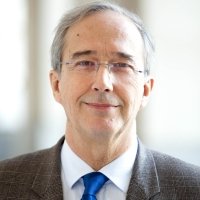Analyzing the Results of the February 26 Iranian Elections
Three experts offered their analysis of the possible economic, political, and foreign policy consequences of the February 26 elections in Iran.
On March 2, 2016, the Middle East Program at the Woodrow Wilson Center hosted the event “Analyzing the Results of the February 26 Iranian Elections,” with Bernard Hourcade, Senior Research Fellow Emeritus at the Centre national de la recherche scientifique in Paris, and Global Fellow for the Middle Program at the Woodrow Wilson Center; Suzanne Maloney, Deputy Director of the Foreign Policy Program at the Brookings Institution; and Mohsen Milani, Executive Director of the Center for Strategic and Diplomatic Studies. Henri Barkey, Director of the Middle East Program at Woodrow Wilson Center, moderated the event.
Milani began the discussion by asserting Washington should not dismiss the Iranian elections as “inconsequential.” He stated that while the nomination process was undemocratic—60 percent of the 12,000 candidates were disqualified—he believes the elections became competitive after the nomination stage. Milani then said the moderates had a sweeping victory, which will now allow for Iranian President Hassan Rouhani to better implement his policy agenda. However, he was quick to note that while Rouhani’s influence has increased, there are still social, religious, and economic institutional factors that will pose significant barriers to his influence and real change. He stressed that the Islamic Republic created these institutions with the goal of making it resistant to popular will. Milani concluded by saying the political spectrum has moved away from conservatives and allowed moderates to support Rouhani’s economic policy, nuclear deal, and relationship to the United States.
Maloney continued the discussion by indicating there was one major way to read the elections: it was a huge win for Rouhani and his economic agenda. Rouhani has framed Iran’s foreign and domestic policies to improve the economy, and Rouhani’s biggest criticism of President Ahmadinejad was the consequences his rhetoric—which affected Iran’s relations with the world—had on Iran’s economy. Maloney argued that even if Iran’s new parliament had a different character, it would not result in any shift in Iran’s policies. She said the most important aspect of the election results is not the ability of the parliament to change policy but the effect the results will have on political discourse for Rouhani’s upcoming re-election campaign. She explained that conservatives historically used economic grievances as a platform against the reformist movement, but now that the parliament is dominated by centrists, it will be more difficult for conservatives to critique Rouhani as he addresses economic issues. Maloney noted that existing political and social institutions will pose significant barriers to Rouhani’s economic agenda. She wrapped up her analysis with the question: will the reformists align themselves with the pro-government camp or advance their own agenda?
Hourcade continued the discussion by emphasizing the need to view Iran through different a lens now and to change how we interpret Iranian politics. Hourcade believes that Iran has an advanced understanding of global affairs but has historically refused to open its door to the world. He suggested the elections have provided new “software” through which Iran can open its doors and become a competitive actor in the international economy. Hourcade then touched upon how Islamism has weakened in Iran and how nationalism has strengthened. His final point was that Iran is a new and strong independent actor in the Middle East and that there is now a cold war between Saudi Arabia and Iran. He asserted that the Syrian conflict is the biggest factor in this cold war, and that in order for Iran to receive massive foreign investment the Syrian issue needs to be resolved. Hourcade ended his analysis by calling for Iran to make its peace with the West, specifically with the United States.
Barkey entered the conversation by asking the panelists what they thought could undermine what looks like a positive revolution. Milani discussed his fear that there will be an “overreaction” to the elections, which will consequentially change critical dynamics. He said that we need to accept the small steps of change Iran is taking. Maloney noted that if foreign companies are uncertain of the political atmosphere in Iran, it will be difficult for Iran to engage with the outside world. Hourcade indicated that the close Iran-Syria relationship will be threatened by Saudi Arabia’s desire to overtake Damascus. Milani added that unless the United States changes its policy toward Iran and Saudi Arabia, we will not be able to see change.
Ultimately, all the panelists agreed that the moderates took a sweeping victory, giving Rouhani unprecedented leverage to push his economic agenda. However, the elections were not revolutionary and there are still several institutional factors in place that can prevent real change.
By Sherin Zadah, Middle East Program
Speakers

Senior Research Fellow Emeritus, Centre National de la Recherche Scientifique, Paris, France


Hosted By

Middle East Program
The Wilson Center’s Middle East Program serves as a crucial resource for the policymaking community and beyond, providing analyses and research that helps inform US foreign policymaking, stimulates public debate, and expands knowledge about issues in the wider Middle East and North Africa (MENA) region. Read more
